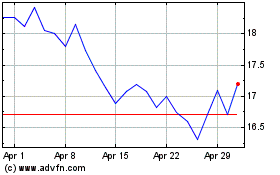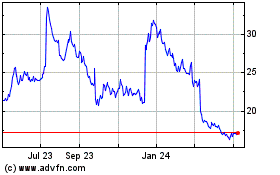Acadia Pharmaceuticals Presents New DAYBUE™ (trofinetide) Clinical Data at the 2024 American Academy of Neurology (AAN) Annual Meeting
April 17 2024 - 4:05PM
Business Wire
Acadia Pharmaceuticals Inc. (Nasdaq: ACAD) today announced that
two oral presentations featuring DAYBUE™ (trofinetide) findings in
Rett syndrome will be presented at the American Academy of
Neurology (AAN) 2024 annual meeting, being held this week in
Denver, CO.
The presentations include outcomes from the DAFFODIL™, a Phase
2/3 open-label study evaluating the safety, tolerability and
exploratory efficacy of DAYBUE in girls aged two to four living
with Rett syndrome, as well as findings from exit interviews with
caregivers of individuals living with Rett syndrome who
participated in the LAVENDER™, LILAC™, LILAC-2™ and DAFFODIL
studies.
AAN Oral Presentations:
- Oral Presentation 003/Abstract 3540: Trofinetide for the
Treatment of Girls Aged Two to Four Years with Rett Syndrome: Final
Results from the Open-label DAFFODIL Study, Wednesday, April 17 at
3:54pm MT
- Oral Presentation 008/Abstract 2877: Assessing Experiences with
Trofinetide for Rett Syndrome: Interviews with Caregivers of
Patients in Open-label Studies, Wednesday, April 17 at 4:54pm
MT
About Rett Syndrome
Rett syndrome is a rare, complex, neurodevelopmental disorder
that may occur over four stages and affects approximately 6,000 to
9,000 patients in the U.S., with approximately 5,000 patients
currently diagnosed according to an analysis of healthcare claims
data.1-4 A child with Rett syndrome exhibits an early period of
apparently normal development until six to 18 months, when their
skills seem to slow down or stagnate. This is typically followed by
a duration of regression when the child loses acquired
communication skills and purposeful hand use. The child may then
experience a plateau period in which they show mild recovery in
cognitive interests, but body movements remain severely diminished.
As they age, those living with Rett may continue to experience a
stage of motor deterioration which can last the rest of the
patient’s life.5 Rett syndrome is typically caused by a genetic
mutation on the MECP2 gene.5 In preclinical studies, deficiency in
MeCP2 function has been shown to lead to impairment in synaptic
communication, and the deficits in synaptic function may be
associated with Rett manifestations.5-7
Symptoms of Rett syndrome may also include development of hand
stereotypies, such as hand wringing and clapping, and gait
abnormalities.8 Most Rett patients typically live into adulthood
and require round-the-clock care.2,9
About DAYBUE™ (trofinetide)
Trofinetide is a synthetic analog of the N-terminal tripeptide
of insulin-like growth factor 1. The mechanism by which trofinetide
exerts therapeutic effects in patients with Rett syndrome is
unknown. Trofinetide is thought to enhance neuronal synaptic
function and morphology. This hypothesis is supported by findings
from studies of trofinetide in a methyl-CpG-binding protein 2 gene
(Mecp2) mouse model of Rett syndrome, in which increased branching
of the dendrites that form synapses and synaptic plasticity signals
were observed.10
Important Safety Information for DAYBUE™
(trofinetide)
- Warnings and Precautions
- Diarrhea: In a 12-week study and in long-term studies,
an aggregate of 85% of patients treated with DAYBUE experienced
diarrhea. In those treated with DAYBUE, 49% either had persistent
diarrhea or recurrence after resolution despite dose interruptions,
reductions, or concomitant antidiarrheal therapy. Diarrhea severity
was of mild or moderate severity in 96% of cases. In the 12-week
study, antidiarrheal medication was used in 51% of patients treated
with DAYBUE. Patients should stop taking laxatives before starting
DAYBUE. If diarrhea occurs, patients should notify their healthcare
provider, consider starting antidiarrheal treatment, and monitor
hydration status and increase oral fluids, if needed. Interrupt,
reduce dose, or discontinue DAYBUE if severe diarrhea occurs or if
dehydration is suspected.
- Weight Loss: In the 12-week study, 12% of patients
treated with DAYBUE experienced weight loss of greater than 7% from
baseline, compared to 4% of patients who received placebo. In
long-term studies, 2.2% of patients discontinued treatment with
DAYBUE due to weight loss. Monitor weight and interrupt, reduce
dose, or discontinue DAYBUE if significant weight loss occurs.
- Adverse Reactions: The common adverse reactions (≥5% for
DAYBUE-treated patients and at least 2% greater than in placebo)
reported in the 12-week study were diarrhea (82% vs 20%), vomiting
(29% vs 12%), fever (9% vs 4%), seizure (9% vs 6%), anxiety (8% vs
1%), decreased appetite (8% vs 2%), fatigue (8% vs 2%), and
nasopharyngitis (5% vs 1%).
- Drug Interactions: Effect of DAYBUE on other Drugs
- DAYBUE is a weak CYP3A4 inhibitor; therefore, plasma
concentrations of CYP3A4 substrates may be increased if given
concomitantly with DAYBUE. Closely monitor when DAYBUE is used in
combination with orally administered CYP3A4 sensitive substrates
for which a small change in substrate plasma concentration may lead
to serious toxicities.
- Plasma concentrations of OATP1B1 and OATP1B3 substrates may be
increased if given concomitantly with DAYBUE. Avoid the concomitant
use of DAYBUE with OATP1B1 and OATP1B3 substrates for which a small
change in substrate plasma concentration may lead to serious
toxicities.
- Use in Specific Population: Renal Impairment
- DAYBUE is not recommended for patients with moderate or severe
renal impairment.
DAYBUE is available as an oral solution (200 mg/mL).
Please read the accompanying full Prescribing Information, also
available at DAYBUE.com
About Acadia Pharmaceuticals
Acadia is advancing breakthroughs in neuroscience to elevate
life. For 30 years we have been working at the forefront of
healthcare to bring vital solutions to people who need them most.
We developed and commercialized the first and only FDA-approved
drug to treat hallucinations and delusions associated with
Parkinson’s disease psychosis and the first and only FDA-approved
drug for the treatment of Rett syndrome. Our clinical-stage
development efforts are focused on Prader-Willi syndrome,
Alzheimer’s disease psychosis and multiple other programs targeting
neuropsychiatric symptoms in central nervous system disorders. For
more information, visit us at Acadia.com and follow us on LinkedIn
and Twitter.
References
1 Acadia Pharmaceuticals Inc., Data on file. RTT US Prevalence.
March 2022. 2 Fu C, Armstrong D, Marsh E, et al. Consensus
guidelines on managing Rett syndrome across the lifespan. BMJ
Paediatrics Open. 2020; 4: 1-14. 3 Kyle SM, Vashi N, Justice MJ.
Rett syndrome: a neurological disorder with metabolic components.
Open Biol. 2018; 8: 170216. 4 Acadia Pharmaceuticals Inc., Data on
file. 5 Amir RE, Van den Veyver IB, Wan M, et al. Rett syndrome is
caused by mutations in X-linked MECP2, encoding methyl-CpG-binding
protein 2. Nat Genet. 1999; 23(2): 185-188. 6 Fukuda T, Itoh M,
Ichikawa T, et al. Delayed maturation of neuronal architecture and
synaptogenesis in cerebral cortex of Mecp2-deficient mice. J
Neuropathol Exp Neurol. 2005; 64(6): 537-544. 7 Asaka Y, Jugloff
DG, Zhang L, et al. Hippocampal synaptic plasticity is impaired in
the Mecp2-null mouse model of Rett syndrome. Neurobiol Dis. 2006;
21(1): 217-227. 8 Neul JL, Kaufmann WE, Glaze DG, et al. Rett
syndrome: revised diagnostic criteria and nomenclature. Ann Neurol.
2010; 68(6): 944-950. 9 Daniel C, Tarquinio DO, Hou W, et al. The
changing face of survival in Rett syndrome and MECP2-related
disorders. Pediatr Neurol. 2015; 53(5): 402-411. 10 Acadia
Pharmaceuticals Inc., Data on file.
View source
version on businesswire.com: https://www.businesswire.com/news/home/20240417338314/en/
Investor Contact: Acadia Pharmaceuticals Inc. Al Kildani (858)
261-2872 ir@acadia-pharm.com
Acadia Pharmaceuticals Inc. Jessica Tieszen (858) 261-2950
ir@acadia-pharm.com
Media Contact: Acadia Pharmaceuticals Inc. Deb Kazenelson (818)
395-3043 media@acadia-pharm.com
Acadia Pharmaceuticals (NASDAQ:ACAD)
Historical Stock Chart
From Oct 2024 to Nov 2024

Acadia Pharmaceuticals (NASDAQ:ACAD)
Historical Stock Chart
From Nov 2023 to Nov 2024
